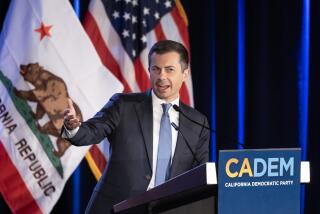Poizner’s wild-eyed accusations against Whitman don’t bode well
From Sacramento — Steve Poizner’s allegation that Meg Whitman used attempted bribery and extortion in an effort to push him out of the gubernatorial race was merely an attention-grabbing stunt by a desperate dark horse, many contend. Hopefully, they’re right.
Because if Poizner was sincerely angry and really does believe -- as he wrote state and federal prosecutors -- that the Whitman camp deserves criminal investigation, this is scary.
It calls into question the state insurance commissioner’s ability to govern the nation’s most populous, most diverse and arguably most troubled state.
It raises the possibility that Poizner has no stomach for making political deals, the kind of mutual back-scratching needed for any democracy to function.
What are potential Capitol deal-makers to think of a wannabe governor who blabs to the world when he receives a private overture from an adversary? They’re to think this guy can’t be trusted. Beware. Venture close at your peril.
“Politics is all about cutting deals,” notes Democratic strategist Darry Sragow. “Unless you’re an amateur, you cut deals and stay on the right side of the law and on the right side of public opinion.”
The screwy thing is that this awkward attempt at a deal only looked amateur. It was handled by a seasoned pro, Whitman political consultant Mike Murphy. He mistakenly put the offer to Poizner in an e-mail, the technological trap these days for many who lull themselves into treating cyberspace as a private communication channel and have forgotten how to dial a telephone.
Actually, Murphy did try to phone a longtime acquaintance in the Poizner camp, pollster Jan van Lohuizen. He’d heard the pollster was privately expressing doubts about Poizner’s ability to beat Whitman in the June Republican primary. Recent public polls have shown Whitman running ahead by roughly 30 points. But Murphy’s call wasn’t returned.
And after having already struck out talking to another Poizner strategist, Murphy decided to e-mail Van Lohuizen. He asked whether “there is anything we can do” to get Poizner out of the race.
“I hate the idea of us each spending $20 million beating on the other in [the] primary . . . and we can spend $40M+ tearing up Steve if we must; bad for him, bad for us and a crazy waste to tear up a guy with [a] great future . . . really the only guy on the CA GOP bench. . . .”
In a reference to U.S. Sen. Dianne Feinstein and World War I, Murphy concluded: “We could unite [the] entire party behind Steve right now to build a serious race against Diane (sic) F in 2012. . . . Thought I’d try one more time before it’s 1914.”
With e-mail in hand, Poizner called a news conference Monday to announce he’d asked law enforcement to “investigate improper conduct” that “threatens the integrity of the electoral process.” He also called it “a crystal-clear threat” to himself.
Investigators probably just rolled their eyes.
Although the strategist carelessly made the pact proposal a news story by committing the offer to writing, at least he inadvertently covered his rear. The e-mail is relatively innocuous compared to Poizner’s harsh characterization of it as “intimidation and threats.”
“I can’t imagine his complaint will go anywhere,” says Robert Stern, an election law attorney and president of the Center for Governmental Studies.
“Poizner doesn’t seem to be aware that he is playing in the big time and that he will be attacked, coerced and cajoled. I am sure he can’t believe that he is not doing better in the polls.”
Trying to coerce your opponent out of a race is time-honored politics. In 1998, airline mogul Al Checchi and attack dogs for Gray Davis bluntly warned Feinstein she’d be blitzed unmercifully if she entered the Democratic gubernatorial primary. She stayed out.
“We wanted to make it clear to her that she was in for a bruising fight if she got in,” recalls Sragow, a Checchi strategist. “It wasn’t personal.”
And offering your opponent an incentive -- maybe a future job -- to step aside is as old as the Republic. Many a cabinet secretary, member of Congress or state senator has sprung from such back-channeling.
The Poizner caper is indicative of this bizarre gubernatorial race, what there is of it.
Both Silicon Valley-rooted Republicans, Poizner and former EBay chief Whitman, are mega-rich and can finance their own campaigns. But their political styles are far different.
Poizner has been trooping up and down the state, easily accessible to reporters and laying out proposals for fixing the state’s finances. Even if his plans are flawed, he’s being specific -- as we pundits preach a candidate should be.
Yet, he hasn’t made much headway with voters. And he had gained little attention until dialing 911 on Whitman.
Political novice Whitman, however, has been ducking political reporters all over California and been kept under wraps by her handlers. She has offered few specifics. Still, she’s way ahead of Poizner, due largely to months of radio ads heard by commuters.
Democratic Atty. Gen. Jerry Brown has been patiently raising and saving money, and been frustratingly mum on specifics. But he has managed to scare off any major primary opponents.
Poizner’s wacky move Monday signals that he intends to stay in the race and fight ferociously. He certainly blew up his best escape bridge.
More to Read
Get the L.A. Times Politics newsletter
Deeply reported insights into legislation, politics and policy from Sacramento, Washington and beyond. In your inbox three times per week.
You may occasionally receive promotional content from the Los Angeles Times.











